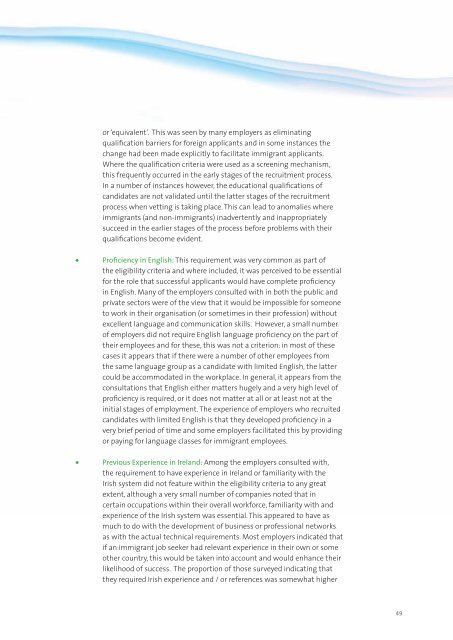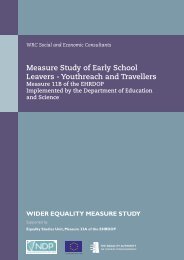Issues and Challenges in the Recruitment and Selection of ...
Issues and Challenges in the Recruitment and Selection of ...
Issues and Challenges in the Recruitment and Selection of ...
You also want an ePaper? Increase the reach of your titles
YUMPU automatically turns print PDFs into web optimized ePapers that Google loves.
or ‘equivalent’. This was seen by many employers as elim<strong>in</strong>at<strong>in</strong>gqualification barriers for foreign applicants <strong>and</strong> <strong>in</strong> some <strong>in</strong>stances <strong>the</strong>change had been made explicitly to facilitate immigrant applicants.Where <strong>the</strong> qualification criteria were used as a screen<strong>in</strong>g mechanism,this frequently occurred <strong>in</strong> <strong>the</strong> early stages <strong>of</strong> <strong>the</strong> recruitment process.In a number <strong>of</strong> <strong>in</strong>stances however, <strong>the</strong> educational qualifications <strong>of</strong>c<strong>and</strong>idates are not validated until <strong>the</strong> latter stages <strong>of</strong> <strong>the</strong> recruitmentprocess when vett<strong>in</strong>g is tak<strong>in</strong>g place. This can lead to anomalies whereimmigrants (<strong>and</strong> non-immigrants) <strong>in</strong>advertently <strong>and</strong> <strong>in</strong>appropriatelysucceed <strong>in</strong> <strong>the</strong> earlier stages <strong>of</strong> <strong>the</strong> process before problems with <strong>the</strong>irqualifications become evident.• Pr<strong>of</strong>iciency <strong>in</strong> English: This requirement was very common as part <strong>of</strong><strong>the</strong> eligibility criteria <strong>and</strong> where <strong>in</strong>cluded, it was perceived to be essentialfor <strong>the</strong> role that successful applicants would have complete pr<strong>of</strong>iciency<strong>in</strong> English. Many <strong>of</strong> <strong>the</strong> employers consulted with <strong>in</strong> both <strong>the</strong> public <strong>and</strong>private sectors were <strong>of</strong> <strong>the</strong> view that it would be impossible for someoneto work <strong>in</strong> <strong>the</strong>ir organisation (or sometimes <strong>in</strong> <strong>the</strong>ir pr<strong>of</strong>ession) withoutexcellent language <strong>and</strong> communication skills. However, a small number<strong>of</strong> employers did not require English language pr<strong>of</strong>iciency on <strong>the</strong> part <strong>of</strong><strong>the</strong>ir employees <strong>and</strong> for <strong>the</strong>se, this was not a criterion: <strong>in</strong> most <strong>of</strong> <strong>the</strong>secases it appears that if <strong>the</strong>re were a number <strong>of</strong> o<strong>the</strong>r employees from<strong>the</strong> same language group as a c<strong>and</strong>idate with limited English, <strong>the</strong> lattercould be accommodated <strong>in</strong> <strong>the</strong> workplace. In general, it appears from <strong>the</strong>consultations that English ei<strong>the</strong>r matters hugely <strong>and</strong> a very high level <strong>of</strong>pr<strong>of</strong>iciency is required, or it does not matter at all or at least not at <strong>the</strong><strong>in</strong>itial stages <strong>of</strong> employment. The experience <strong>of</strong> employers who recruitedc<strong>and</strong>idates with limited English is that <strong>the</strong>y developed pr<strong>of</strong>iciency <strong>in</strong> avery brief period <strong>of</strong> time <strong>and</strong> some employers facilitated this by provid<strong>in</strong>gor pay<strong>in</strong>g for language classes for immigrant employees.• Previous Experience <strong>in</strong> Irel<strong>and</strong>: Among <strong>the</strong> employers consulted with,<strong>the</strong> requirement to have experience <strong>in</strong> Irel<strong>and</strong> or familiarity with <strong>the</strong>Irish system did not feature with<strong>in</strong> <strong>the</strong> eligibility criteria to any greatextent, although a very small number <strong>of</strong> companies noted that <strong>in</strong>certa<strong>in</strong> occupations with<strong>in</strong> <strong>the</strong>ir overall workforce, familiarity with <strong>and</strong>experience <strong>of</strong> <strong>the</strong> Irish system was essential. This appeared to have asmuch to do with <strong>the</strong> development <strong>of</strong> bus<strong>in</strong>ess or pr<strong>of</strong>essional networksas with <strong>the</strong> actual technical requirements. Most employers <strong>in</strong>dicated thatif an immigrant job seeker had relevant experience <strong>in</strong> <strong>the</strong>ir own or someo<strong>the</strong>r country, this would be taken <strong>in</strong>to account <strong>and</strong> would enhance <strong>the</strong>irlikelihood <strong>of</strong> success. The proportion <strong>of</strong> those surveyed <strong>in</strong>dicat<strong>in</strong>g that<strong>the</strong>y required Irish experience <strong>and</strong> / or references was somewhat higher49




